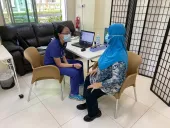
A robot a day keeps the doctor away
Patient care will radically change as AI solutions gain more traction.
Savvy chatbots and wearable sensors may soon take the place of face-to-face doctor’s appointments. This may sound like science fiction, but these solutions are closer to reality than many think. Singapore, for instance, has rolled out Smart Health TeleRehab, which allows patients to undergo their rehabilitation exercises at a time and location of their choice, through the use of wearable sensors and remote monitoring by therapists.
“Smart Health TeleRehab could transform how therapy services are delivered in Singapore,” says Chee Hong Tat, senior minister of state for health, after visiting the home of a patient to view how Smart Health TeleRehab was deployed. The solution was developed together with the National University of Singapore (NUS) Department of Electrical & Computer Engineering and the Saw Swee Hock School of Public Health.
Easy to set up, the system detects and measures motor movements with sensors and algorithms. This enables immediate feedback to patients on whether they are performing the exercises correctly. A video conferencing feature is available to enable patients to consult therapists remotely. Therapists are able to review their patients’ progress asynchronously via smart dashboards.
“Patients will benefit from greater convenience, cost savings, and better outcomes. Therapists and therapy service providers will also benefit from the productivity improvements,” Chee says.
Artificial intelligence can be particularly useful in improving geriatric care. “Technology use in eldercare reduces the reliance of trained healthcare manpower by empowering the patients and their family on the care supported by timely input of information to patients and their families or continual monitoring of chronic disease and early warning of flares or decompensation,” notes Dr. Tan Jit Seng, director, Lotus Eldercare Health Services.
For instance, some elderly care facilities already use robots like Ohmni, ExoAtlet, and Loomo. Ohmni allows family members and caregivers to engage remotely over the Internet and check on the elders’ safety and make sure they follow their diet or medication. Geriatric specialists can also dial-in on-demand simultaneously to provide services. ExoAtlet, meanwhile, uses robotics for exoskeletal support, doing away with the stigma of using a wheelchair. Loomo, on the other hand, is used mainly for telepresence, infotainment, daily routine support, and cognition/mood/routine monitoring.
“With robotics and artificial intelligence, individual clinics, hospital departments, nursing home, and care facilities, among others, can seamlessly list their services and other important information in their chatbot avatars. Chatbots for health advisory are already available to those savvy in chatbots, but in the future, the healthcare industry will be empowered to use these tools as the next form of automation and communication,” Tan says.













 Advertise
Advertise













